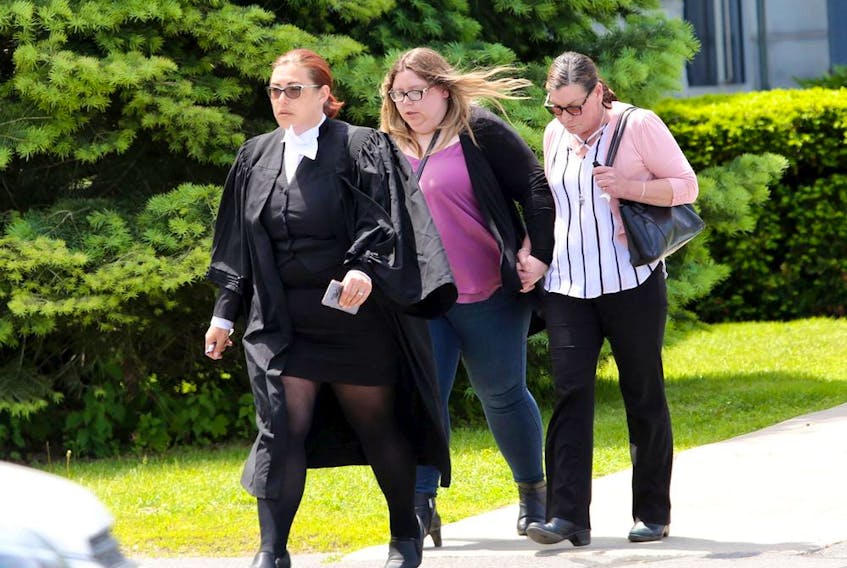NAPANEE, Ont. — A lawyer representing a 27-year-old Ontario woman who has pleaded guilty to infanticide in the 2015 death of her newborn daughter told a sentencing hearing Wednesday that rehabilitation should be the “primary consideration.”
Lawyer Paul Blais told Justice Graeme Mew that the “gravity is quite high” for the offence of infanticide, and that Mew will have a “balancing act” in choosing the correct sentence, but that “less-restrictive sanctions are appropriate” in this case.
Kirsten Pemberton pleaded guilty Monday to infanticide and to concealing the dead body of a child in the death of her newborn baby in February 2015. She gave birth to the child in her parents’ Loyalist Township home and then wrapped her in a sheet and clothing and placed her in her closet.
She was arrested in May 2015 in Alberta after her mother discovered the baby’s remains in her daughter’s closet.
Blais argued that Pemberton should also be permitted to serve concurrent sentences for the two charges to which she pleaded guilty because, in his view, the baby’s death “occurred in the act of a concealment.”
“We’re dealing with one act,” Blais said.
Blais read from a transcript of testimony from a number of psychiatrists and psychologists who evaluated Pemberton after her arrest and he highlighted the many references to mental illness, in which the expert witnesses used words like “confused, disoriented, anxious” to describe their observations of Pemberton. They also said Pemberton was experiencing or had experienced “depersonalization and derealization” — conditions that are marked by a detachment of thoughts, feelings and bodily actions, and an “altered sense of reality.”
There was also reference to hallucinations and delusions, and Blais read sections of testimony that said Pemberton had a belief “that the spirits of her deceased children were speaking to her.”
Four psychologists agreed that Pemberton had schizophrenia and agreed that her symptoms dated back to around the time that she had an abortion in January 2014.
Blais referenced a number of infanticide cases in his recommendations for Pemberton’s sentencing, including an infanticide case where the judge found a “direct causal connection” between the woman’s mental illness and her multiple offences of infanticide. He pointed out that the judge found it unnecessary to imprison someone who is “mentally ill” as a deterrent to society when the mental illness “was the cause” of her offences.
“Having her continue with counselling is the best way to make sure the community is safe,” Blais said.
But Crown attorney Monica Heine said the baby’s death was not “an act of concealment,” but “an act of murder.”
Heine noted Pemberton had stated that she knew that her baby, who “cried and moved” following the birth, would not be able to breathe once she wrapped her in a sheet and clothing and placed her in a bag.
In response to psychiatric assessments that Pemberton was in “total denial of her pregnancy,” Heine countered that after being presented with evidence of Pemberton’s Internet search history — which included searching for abortion, baby names and adoption agencies, as well as inquiry emails to a local adoption agency in which she self-identified as the “birth mother” — some psychiatrists changed their wording from “total” to “intermittent.”
The Crown also noted that a conviction of infanticide already implies a “disturbance of the mind,” and therefore Pemberton’s mental illness should not be considered in her sentencing.
“It’s wrong in law to suggest a disturbance of the mind has any causal link to the killing of a child,” Heine said, pointing out it is a “prerequisite” of infanticide.
“If that state of mind isn’t present, then the act would be murder or manslaughter,” she said.
The Crown is seeking three years imprisonment for Pemberton: two years for the infanticide guilty plea and one year for concealing the body. The maximum sentence for a conviction of infanticide is five years.
The defence would like to see Pemberton receive credit for 21 months time served, based on her time in detention, in hospital and on bail under house arrest, and not receive any jail time.
Mew gave Pemberton the chance to speak after submissions had been completed.
“I just want to say that I’m sorry,” she said, weeping, while being comforted by her lawyer.
“I want to try to move forward with my family.”
Pemberton will receive her sentence on July 10.
Copyright Postmedia Network Inc., 2019









